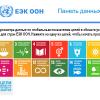Statistics Press Releases
Displaying Results 26 - 50 of 64
UNECE today publishes a Set of Core Climate Change-related Indicators and Statistics, along with a set of Implementation Guidelines, both endorsed by the Conference of European Statisticians (CES).
Climate change is an existential threat and poses an immense challenge for humanity. A better
Countries across the pan-European region and North America are intensifying efforts to make their resource use more circular: to close the loop between raw materials, products and wastes so that materials remain in use and consumption of finite resources is reduced. But the lack of an
More robust monitoring and measuring systems are required to meet the Sustainable Development Goals (SDGs), according to a UNECE report on Measuring and Monitoring progress towards SDGs that uses a “nexus” approach to chart a course for more “joined up” activities.
High-quality statistics are
UNECE calls for integrated and sustainable natural resource use through a "nexus" approach
The use of material resources, fuelled by economic and population growth, urbanisation and societal changes, has increased more than ten times since 1900 and is set to double again by 2030. The annual global extraction of materials has increased from 27 to 92 billion tonnes since 1970, while the
UNECE’s Dashboard for SDGs is now available in Russian, broadening the spectrum of constituents from across the region who can now access it with ease. The dashboard, launched in English in 2020, brings together available data for the 56 UNECE member States to provide a regional perspective on the
Si la région de la CEE-ONU suit les tendances actuelles, d'ici 2030, elle n'atteindra que 23 des 169 cibles des ODD. Cependant, seules 89 cibles peuvent être évaluées, tandis que pour les 80 autres, aucune évaluation ne peut être faite en raison de données insuffisantes.
Pour 57 cibles, les
Saviez-vous que plus de 80 % des migrants quittent à nouveau la Suisse dans les 17 ans suivant leur arrivée ? Ou qu'en Italie, 15 % des migrants originaires de Chine se déplacent au moins deux fois dans le pays au cours des cinq années suivant leur arrivée ?
Voici quelques exemples d'
Les recommandations statistiques publiées aujourd'hui aideront les pays à approfondir l'un des aspects les plus difficiles à observer de l'égalité des genres : la répartition du pouvoir et de la prise de décision au sein des ménages.
Tous les grands cadres politiques internationaux sur l'égalité
A UNECE study launched today, ‘Keeping Count: conducting the 2020 round of population and housing censuses during the Covid-19 pandemic’ explores the impacts of the pandemic on all aspects of censuses, from data collection to public communication.
Drawing on insights from 52 member States
New statistical guidance launched today by UNECE will strengthen countries’ ability to measure poverty through improved data disaggregation – a critical step to meeting the first of the Sustainable Development Goals, SDG 1, “end poverty in all its forms everywhere”.
Poverty is complex. It is not
The UNECE Steering Group on Population and Housing Censuses, a group of 20 census experts representing 17 countries and international organizations, has released a study, New Frontiers for Censuses Beyond 2020, exploring the new challenges and opportunities for censuses in the region beyond the
Education brings many benefits, among them economic ones: the knowledge and capacities obtained by students and trainees allow them to contribute productively, with the advanced skills needed to fuel our modern economies that rely on specialized services and technologies. The essential role of
As the world tackles the spread of COVID-19 and its unprecedented impacts on economies, societies and the environment, we are all stepping into unknown territory. Everybody, from politicians to parents, from newly unemployed workers to nurses, from supermarket cashiers to schoolchildren in front of
The world is facing a crisis like no other. Policymakers are pursuing the combined aims of saving lives and minimizing the adverse economic, social and environmental impacts, and to do so they must take hard decisions and bold moves, quickly and transparently. Such decisions depend on solid data
Two stark trends are becoming ever-more present in today’s world: rapid urbanization, and a growing number and intensity of hazardous events related to climate change. The combination of these two forces makes for an increasing exposure to risk for people, the economy and the environment. The
UNECE has today launched a first Regional report on progress towards the Sustainable Development Goals (SDGs). This comes at a key juncture in the follow-up and review of the 2030 Agenda since its adoption in 2015, and will help to sharpen efforts as we enter the Decade of Action to deliver the
The Sustainable Development Goals’ globally-agreed framework of 232 indicators allows everyone—governments, researchers, civil society, business and beyond—to keep track of how our countries are progressing towards environmental, social and economic sustainability.
A new UNECE Dashboard for SDGs
The 2030 Agenda sets the ambitious objective of eliminating inequalities among people on the planet. Many factors are linked with inequalities —people’s income level, where they live, their gender, their ethnicity, and their age, to name a few.To know where these inequalities exist, as well as to
The gender pay gap remains a critical issue in all countries of the UNECE region. Although the gap has narrowed in most UNECE countries since 2012, it remains at 16% on average in hourly rates, and 21% in monthly earnings.
Huge differences are seen across the region: the hourly rate pay gap
Designing policies, tracking progress and holding policymakers accountable for their decisions depends on high quality, reliable and comparable statistical indicators. The essential role of data and statistics for fulfilling the SDGs is marked by their inclusion within the goals themselves: goal 17
How are we doing?
This question is at the core of many official statistics. When we measure growth in the economy, changing population health, life expectancy or prices, we do so because ultimately we want to know how well our society is doing. Is life getting better or worse? How do we compare
Official statistics are an indispensable element of the information system of democratic societies, serving governments, economies and the public with data that can help them understand and make decisions about the economy, the population, society and the environment. An essential precondition for
International labour migration is an increasingly important feature of the interconnected global economy. It has never been easier for people to travel and work in other countries, especially in common market areas such as the European Union. This expansion of international labour mobility has
‘Evidence-based decision-making’. It’s a term that rolls off the tongue almost without having to think about it, so commonplace has it become in the everyday jargon of policy-making and sustainable development circles.
But it’s something that does bear thinking about. What is a decision taken
Measuring international migration is a complex task. To paint a complete picture we need to know not only how many people enter and leave a country—which in itself is challenging enough—but also the characteristics of those people and the ways in which they integrate into and impact societies.The







